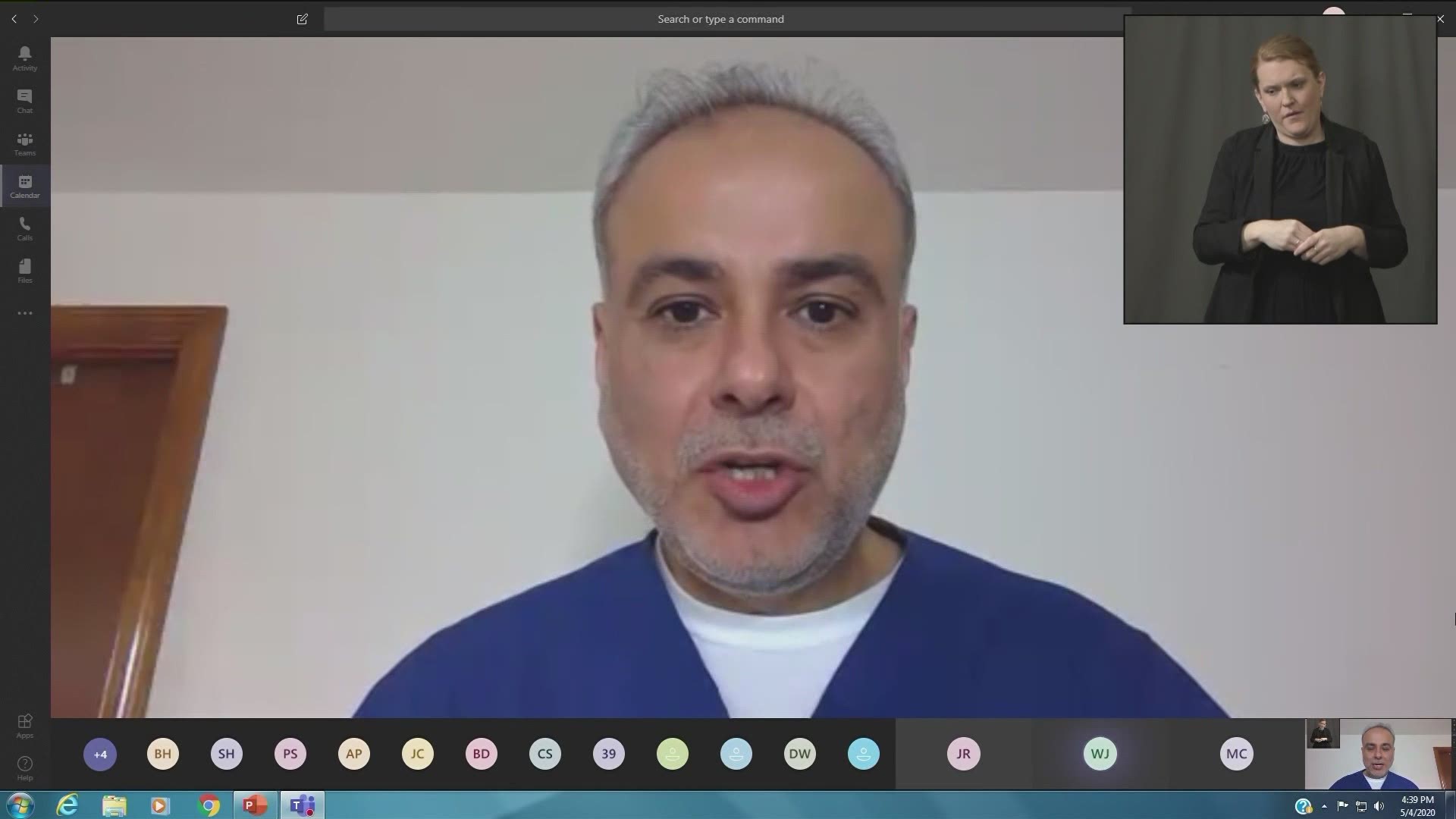HARTFORD, Conn. — Hospitalizations from COVID-19 dropped in Connecticut for the 12th day in a row, which Governor Ned Lamont said is an important metric for reopening the state's economy.
According to the state, 1,464 patients are currently hospitalized, a decrease of 24. Governor Lamont said hospitalizations dropped in Fairfield, Hartford, and New Haven counties.
"The other counties have not really had a big uptick thanks to social distancing and taking that seriously," Governor Lamont said.
As of Monday, there were 30,173 total COVID-19 positive cases, an increase of 886. Fatalities from the disease went up by 61 to 2,556. In all, 105,330 tests have been performed, an increase of 2,837.
After a briefing with The White House and governor's from across the U.S., Governor Lamont said the "PPE is beginning to flow.” He said a big shipment from the national stockpile will head to Connecticut nursing homes over the next few weeks. He also spoke about a joint purchasing cooperative created between seven northeastern states, which was announced Sunday.
"You may say, 'Well, aren't we on the backside of this? Why do we have to do this now just when things are beginning to flow? … aren't we over this?' The answer is no, we're not over this," Governor Lamont said. "And I think my fellow governors, Republican and Democrat, are really smart. They're going to say, 'Look, I'm glad we got some flow coming in from the federal government. I don't want to always have to wait and see if that plane lands from China.' We're going to take this into our own account if we can."
Governor Lamont also announced "pretty good news," on Monday in terms of the Paycheck Protection Program. He said the state did "well in the first round," for PPP but said the state did "very well" in the second round.
"We had over 30,000 Connecticut companies get a PPP forgivable loan in this round. That's $2.5 billion more to the state," Governor Lamont said.
Governor Lamont invited two guests to speak at Monday’s briefing, including State Senator Saud Anwar, (D-South Windsor), a medical doctor who specializes in pulmonology and critical care medicine, and State Representative William Petit, Jr. (R- Plainville, New Britain), who is a retired endocrinologist.
Dr. Anwar, who works in the ICU, said he is seeing "the ugly face of the disease."
"This disease, by the time a patient gets to the ICU, takes away their ability to exchange oxygen or blow off their carbon dioxide, and leads to multiple organ failure." Dr. Anwar said the lungs and the kidneys are most affected.
Dr. Anwar said hospitals are seeing "heroic efforts," of health care workers putting themselves at risk to take care of patients.
"That's the reason we have relatively good results in the state of Connecticut with the critically ill patients," Dr. Anwar said.
Dr. Anwar also spoke about a medication given the greenlight by the FDA called Remdesivir.
"I think the Remdesivir gives a little bit of a hope, because it does have an antiviral impact and it does help us get hopefully less hospital days." Dr. Anwar said. He said the medication can lower the severity of illness, but the challenge with it at this point is access.
"We were using it for compassionate cases for children… and pregnant women," said Dr. Anwar. He said with the FDA's approval, access to it should improve.
Dr. Anwar also put out a call for plasma donations, specifically from people who have recovered from COVID-19.
"We are hoping more and more people will be able to donate plasma. It can be very effective and helpful in reducing the disease burden or the severity of disease in many patients," Dr. Anwar said. According to Dr. Anwar, they are looking COVID-19 patients who have healed and are about 28 days out of recovery.
Both Dr. Anwar and Rep. Petit said they're hearing concerns about anxiety when it comes to health and finance. Rep. Petit said many people are looking for specific advice on reopening businesses.
"If restaurants and nail salons are going to be open in two weeks, they want a specific list of things that they must do," said Rep Petit. "And I'll give you a specific example…if they're going to have to be physical barriers in place, people need time to be able to obtain the raw materials and construct the physical barriers that may be needed. Businesses need the time to be able to obtain the protective equipment - masks, gowns, sanitizing materials as well."
Governor Lamont said his administration is meeting with the restaurant and retail associations to get the best ideas they can to determine appropriate protocols. He said they would be able to outline them in about a week so "then everybody would have at least a couple of weeks to prepare accordingly for the opening of their business."
In regards to restaurants opening, FOX61 asked officials if dining out should be for families only, or if people from separate households could dine together.
Rep Petit responded, "I personally would, if you're living together and have been throughout your entire quarantine time, I think it's fine to sit together, but at this point I still wouldn't sit together with other families. I would continue social distancing until we're farther along."
On behalf of a viewer, FOX61 also asked about tattoo parlors and why they won't be able to open on May 20th with nail and hair salons.
Governor Lamont said, "The advice I got from our committee - and I thought it was well taken. While a lot of people think it's great to do, it's not absolutely essential. It's very tough to socially distance. It created one more possibility of risk of potential contagion. Maybe let's see how it goes with the nail salons and that will give us a little more perspective for the next round of opening."
Governor Lamont addressed concerns that May 20th is too soon to open. Governor Lamont said it will be important to look at states that eased restrictions recently.
"What we have by May 20th is we've got three weeks of experience… in places like Georgia. That gives us a little bit of an indication," Governor Lamont said. "We've got the necessary masks and protective gear - so if small businesses can't provide it for themselves, we'll be able to provide it for them."
Governor Lamont also said testing is ramping up and he has "early intel," on where flare-ups could be.
"And to be blunt about it, if you find on May 27th that we've had some flare ups and it looks like the nail salons are risky - we could always throttle it back, but I hope we don't have to do that."


